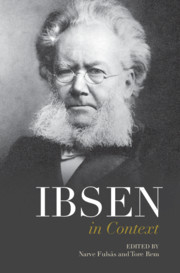Book contents
- Ibsen in Context
- Ibsen in Context
- Copyright page
- Contents
- Figures
- Contributors
- Preface
- Notes on the text
- Chronology
- Part I Life and Career
- Part II Culture and Society
- Part III Scandinavian Reception
- Part IV Internationalization
- Part V Afterlives
- Chapter 24 Biographies
- Chapter 25 Academic Responses
- Chapter 26 American Ibsens
- Chapter 27 Japanese Ibsens
- Chapter 28 Chinese Ibsens
- Chapter 29 Indian Ibsens
- Chapter 30 Mass Media and Popular Reception
- Further Reading
- Index
Chapter 25 - Academic Responses
from Part V - Afterlives
Published online by Cambridge University Press: 23 April 2021
- Ibsen in Context
- Ibsen in Context
- Copyright page
- Contents
- Figures
- Contributors
- Preface
- Notes on the text
- Chronology
- Part I Life and Career
- Part II Culture and Society
- Part III Scandinavian Reception
- Part IV Internationalization
- Part V Afterlives
- Chapter 24 Biographies
- Chapter 25 Academic Responses
- Chapter 26 American Ibsens
- Chapter 27 Japanese Ibsens
- Chapter 28 Chinese Ibsens
- Chapter 29 Indian Ibsens
- Chapter 30 Mass Media and Popular Reception
- Further Reading
- Index
Summary
The chapter outlines four major currents in academic Ibsen criticism, all of which have their roots in how Ibsen’s plays were received as early as the 1860s. The modernist Ibsen stems from his well-known inscrutability, and reached its peak in the criticism of the mid-twentieth century. Critics focusing on the realist Ibsen typically highlight his power as a social critic, in the tradition of George Bernard Shaw’s The Quintessence of Ibsenism from 1890. The image of an idealist Ibsen emerges from the seemingly indefatigable existence of lofty ideals in his work, ideals that remain in sight whether or not they prove tragically unfulfilled. Finally, there is a romantic-demonic Ibsen, particularly analysed by G. Wilson Knight and Harold Bloom, which emphasizes the playwright’s tendency to first and foremost delight in his own aestheticized transgressions of ordinary morality.
- Type
- Chapter
- Information
- Ibsen in Context , pp. 223 - 230Publisher: Cambridge University PressPrint publication year: 2021

